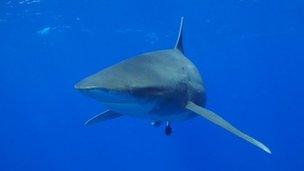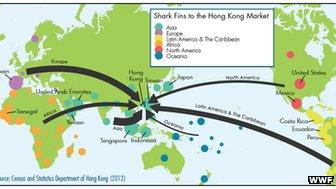Cites meeting votes to protect Oceanic whitetip shark
- Published

The Oceanic whitetip is found in tropical and warm temperate seas
Delegates at the Cites conservation meeting in Thailand's capital, Bangkok, have voted to extend the protection to a threatened species of shark.
The Oceanic whitetip has seen its numbers decline dramatically in recent years because of overfishing for fins.
Campaigners said the move to record and regulate all trade in the species was historic, and that they believed two other sharks would also be protected.
However, the decisions could still be overturned on appeal at the meeting.
An estimated 100 million sharks are killed by commercial fishing every year, researchers have recently reported. They blame a huge appetite for shark-fin soup in China and Hong Kong for stimulating the trade.
The Oceanic whitetip and the two other species for which campaigners are seeking further protection, external - the Hammerhead and the Portbeagle - are highly valued for their fins.
The conservation meeting will also decide whether to regulate trade in two types of manta ray hunted for their gill plates, which are used in some Chinese traditional medicines.
Momentum building
After a tense debate, delegates voted by 92 votes to 42 to upgrade the Oceanic whitetip to Appendix II of the Convention on International Trade in Endangered Species of Wild Fauna and Flora (Cites).
Appendix II, external lists species which are not necessarily now threatened with extinction but which may become so unless trade is closely controlled.
Campaigners were delighted with the outcome of the vote, but cautioned that it could still be overturned before the end of the meeting.
Dr Susan Lieberman from Pew Environment Group said it was a big day for the convention.
"It is a great victory for conservation, but it is a great victory for Cites as well. It is 40 years old, it is a real coming of age," she told the BBC.
Many attendees say the move is highly significant because it is the first time that Cites delegates have voted to protect a commercially valuable species of shark.
"It does set a tone that countries are finally ready to accept that we need Cites listings for commercially valuable, highly-traded highly-threatened shark species," said Sonja Fordham from Shark Advocates International.
Even though the vote was 92 to 42 in favour, it barely reached the two thirds majority needed to become part of Cites regulations. Two other species of threatened shark will be voted on later on Monday.

A large number of countries fish for shark but most trade goes through Hong Kong
"The momentum is building," Dr Liebermann said. "I'm optimistic that the Hammerheads will go through as well."
China and Japan strongly oppose the moves to upgrade the three shark species, and there had been much talk about undue pressure being brought to bear on developing countries.
Many believe their underlying concern is about Cites having power over commercial fishing.
But in the end it was European Union money that might have played a crucial role with the Oceanic whitetip vote.
The head of the EU's delegation told the meeting that extra cash would be made available to help poorer countries change their fishing practices.
"If there's a need for it the funding will be available," Feargal O'Coigligh said.
Whatever the outcomes of the other votes, all of them can be overturned in the final, plenary session of this meeting. However, re-opening a proposal requires support from a third of member states.
At present only a handful of sharks are offered some level of protection under Cites. These are the whale shark, basking shark, great white shark, and seven sawfishes.
Follow Matt on Twitter, external.
- Published7 March 2013
- Published13 December 2012